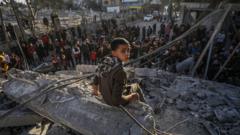Dr. Abdallah Shabir, an emergency physician in Gaza City, articulated the pervasive sense of dread as he detailed the continuous airstrikes that have wreaked havoc on civilians. He recounted the overwhelming flood of casualties arriving at the Baptist Hospital shortly after the ceasefire was announced, underscoring the deadly irony of hope turning into panic.
With 69% of Gaza's infrastructure either destroyed or severely damaged, many residents, including Sabreen Doshan, are contemplating their return to bombed-out homes. Doshan, who lost 17 family members throughout the conflict, expressed her yearning for normalcy, despite the destruction that awaits her. Similarly, Wael Muhammad, a freelance journalist residing in a refugee camp, voiced a bittersweet mixture of relief and sorrow at the prospect of a ceasefire, capturing the emotional turmoil felt across the region.
The ceasefire agreement also entails the first phase of a hostage exchange, raising concerns about its implementation. UNRWA's communications director, Juliette Touma, highlighted the dire humanitarian conditions that persist for many Gazans, noting that overcrowded shelters and insufficient basic needs cast a shadow over the looming ceasefire. As residents like Khalil Nateel remain vigilant in makeshift shelters, they are gripped by the fear of last-minute violence jeopardizing their only hope for peace.
The situation in Gaza remains fluid, with many awaiting the promised ceasefire while grappling with the harsh realities of war and loss.
With 69% of Gaza's infrastructure either destroyed or severely damaged, many residents, including Sabreen Doshan, are contemplating their return to bombed-out homes. Doshan, who lost 17 family members throughout the conflict, expressed her yearning for normalcy, despite the destruction that awaits her. Similarly, Wael Muhammad, a freelance journalist residing in a refugee camp, voiced a bittersweet mixture of relief and sorrow at the prospect of a ceasefire, capturing the emotional turmoil felt across the region.
The ceasefire agreement also entails the first phase of a hostage exchange, raising concerns about its implementation. UNRWA's communications director, Juliette Touma, highlighted the dire humanitarian conditions that persist for many Gazans, noting that overcrowded shelters and insufficient basic needs cast a shadow over the looming ceasefire. As residents like Khalil Nateel remain vigilant in makeshift shelters, they are gripped by the fear of last-minute violence jeopardizing their only hope for peace.
The situation in Gaza remains fluid, with many awaiting the promised ceasefire while grappling with the harsh realities of war and loss.

















